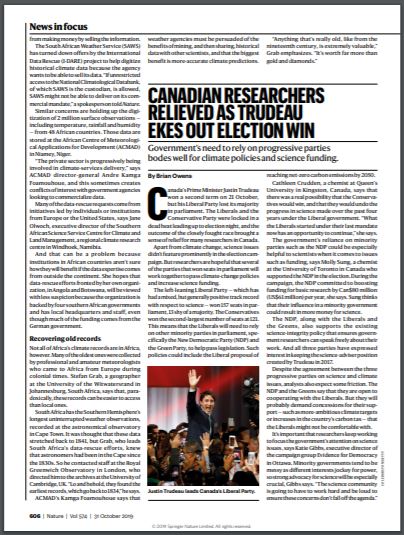Canadian scientists relieved as Trudeau ekes out election win, Progressive parties’ showing bodes well for action on climate policies and science funding, researchers say by Brian Owens, Oct 22, 2019, Nature 574, 606 (2019), doi: 10.1038/d41586-019-03208-w

Canada’s Prime Minister Justin Trudeau won a second term on 21 October, but his Liberal Party lost its majority in parliament. The Liberals and the Conservative Party were locked in a dead heat leading up to election night, and the outcome of the closely fought race brought a sense of relief for many Canadian researchers.
Apart from climate change, science issues didn’t feature prominently in the election campaign. But researchers are hopeful that several of the parties that won seats in parliament will work together to pass climate-change policies and increase science funding.
… Cathleen Crudden, a chemist at Queen’s University in Kingston, Canada, says that there was a real possibility that the Conservatives would win, and that they would undo the progress in science made over the past four years under the Liberal government. “What the Liberals started under their last mandate now has an opportunity to continue,” she says.
Holding onto hope
The minority parties, such as the NDP, could be especially helpful for issues including science funding, says Molly Sung, a chemist at the University of Toronto in Canada who supported the NDP during the election. During the campaign, the NDP committed to boosting funding for basic research by Can$80 million (US$61 million) per year. Sung thinks that their influence in a minority government could result in more money for science.
The NDP, along with the Liberals and the Greens, also support the existing science-integrity policy that ensures government researchers can speak freely about their work. And they have expressed interest in keeping the science adviser position created by Trudeau in 2017.
Despite the agreement between the three progressive parties on science and climate issues, analysts also expect some friction. The NDP and the Greens say that they are open to cooperating with the Liberals. But they will probably demand concessions for their support — such as more-ambitious climate targets or increases in the country’s carbon tax — that the Liberals might not be comfortable with.
It’s important that researchers keep working to focus the government’s attention on science issues, says Katie Gibbs, executive director of the campaign group Evidence for Democracy in Ottawa. Minority governments tend to be messy as different interests jockey for power, so strong advocacy for science will be especially important going forward, Gibbs says. “The science community is going to have to work hard and be loud to ensure these concerns don’t fall off the agenda.”
